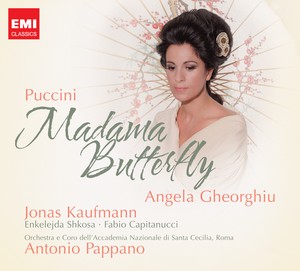|
|
|
|
|
|
|
|
| AllmusicGuide |
| by Stephen Eddins |
|
|
|
Madama Butterfly |
|
|
|
 The
most notable thing about this recording of Madama Butterfly is the
conducting of Antonio Pappano. His reading emphasizes the opera's dramatic
intensity, and has a sinewy, sometimes brutal power that never lets the
listener forget the cruelty and arrogance that are at its core. Pappano
highlights the modernist elements in Puccini's score -- its harsh
dissonances, sometime startling orchestration, and astonishing harmonically
unresolved conclusion -- that tend to be glossed over in more conventionally
romantic performances. His approach throws the irony of the love scene into
harsh relief, and makes Cio-Cio-San's naïve devotion all the more poignant.
The rhythmic fluidity that he brings to the score creates a terrific sense
of spontaneity and vitality, and his attention to detail, such as having the
strings subtly bend the tone in the pentatonic sections, creates a lovingly
nuanced performance. Altogether, it's a revelatory version of the opera.
Having a uniformly outstanding cast and two stars at the top of their form
also contributes hugely the recording's impact. The minor roles are all
vividly etched and are sung beautifully. Relative unknowns Enkelejda Shkosa
and Fabio Capitanucci convey tremendous compassion as Suzuki and Sharpless
and sing with assurance and understanding. Angela Gheorghiu and Jonas
Kaufmann don't have the distinctiveness to compete with the legendary
Butterflys and Pinkertons of previous generations, but for modern
performers, they are exceptionally successful in filling out the roles.
Kaufmann is known for the intensity with which he throws himself into his
roles, and he's completely convincing as an arrogant, opportunistic
imperialist who can also be a real charmer. His timbre is heroic, and he
sings with a compelling Latinate fervor. Gheorghiu's tone is pure and
focused, she sings with engaging warmth and soaring openness. She has plenty
of unforced power when it's called for, and Un bel dì vedremo is searingly
intense. She may not be completely persuasive in the nearly impossible task
of conveying the adolescent innocence of a 15 year old, but that's easily
forgivable because her Butterfly is so tenderly appealing and touchingly
vulnerable. The sound of EMI's studio recording is immaculately clean, with
excellent balance and a realistic ambience. The
most notable thing about this recording of Madama Butterfly is the
conducting of Antonio Pappano. His reading emphasizes the opera's dramatic
intensity, and has a sinewy, sometimes brutal power that never lets the
listener forget the cruelty and arrogance that are at its core. Pappano
highlights the modernist elements in Puccini's score -- its harsh
dissonances, sometime startling orchestration, and astonishing harmonically
unresolved conclusion -- that tend to be glossed over in more conventionally
romantic performances. His approach throws the irony of the love scene into
harsh relief, and makes Cio-Cio-San's naïve devotion all the more poignant.
The rhythmic fluidity that he brings to the score creates a terrific sense
of spontaneity and vitality, and his attention to detail, such as having the
strings subtly bend the tone in the pentatonic sections, creates a lovingly
nuanced performance. Altogether, it's a revelatory version of the opera.
Having a uniformly outstanding cast and two stars at the top of their form
also contributes hugely the recording's impact. The minor roles are all
vividly etched and are sung beautifully. Relative unknowns Enkelejda Shkosa
and Fabio Capitanucci convey tremendous compassion as Suzuki and Sharpless
and sing with assurance and understanding. Angela Gheorghiu and Jonas
Kaufmann don't have the distinctiveness to compete with the legendary
Butterflys and Pinkertons of previous generations, but for modern
performers, they are exceptionally successful in filling out the roles.
Kaufmann is known for the intensity with which he throws himself into his
roles, and he's completely convincing as an arrogant, opportunistic
imperialist who can also be a real charmer. His timbre is heroic, and he
sings with a compelling Latinate fervor. Gheorghiu's tone is pure and
focused, she sings with engaging warmth and soaring openness. She has plenty
of unforced power when it's called for, and Un bel dì vedremo is searingly
intense. She may not be completely persuasive in the nearly impossible task
of conveying the adolescent innocence of a 15 year old, but that's easily
forgivable because her Butterfly is so tenderly appealing and touchingly
vulnerable. The sound of EMI's studio recording is immaculately clean, with
excellent balance and a realistic ambience. |
|
|
|
|
|
|
|
|
|
|
|
|
|
|
|
|
|
|